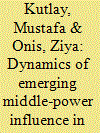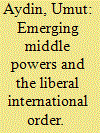| Srl | Item |
| 1 |
ID:
151999


|
|
|
|
|
| Summary/Abstract |
This article attempts to understand the properties, potentials and limits of middle-power activism in a changing global order. Extensive debate on the rise of emerging powers notwithstanding, the potential contributions of emerging middle powers in regional and global governance, and the imminent challenges they face in their struggle for an upgraded status in the hierarchy of world politics, is an understudied issue. This study aims to fill this gap by offering a broad conceptual framework for middle-power activism and testing it with reference to the Turkish case. In this context, the authors aim to address the following questions: What kind of roles can emerging middle powers play in a post-hegemonic international system? What are the dynamics, properties and limitations of emerging middle-power activism in regional and global governance? Based on an extensive study of the Turkish case, the authors’ central thesis is that emerging middle powers can make important contributions to regional and global governance. Their ultimate impact, however, is not inevitable, but depends on a complementary set of conditions, which are outlined in this study.
|
|
|
|
|
|
|
|
|
|
|
|
|
|
|
|
| 2 |
ID:
180367


|
|
|
|
|
| Summary/Abstract |
In the post-Cold War era, a number of middle powers rose to prominence thanks to domestic reforms and a favourable international environment of economic and political globalization. These countries began to pursue middle power foreign policies, working actively in international organizations, engaging in areas such as conflict mediation, humanitarian assistance and the promotion of human rights, and helping to diffuse democracy and market reforms in their neighbourhoods. In this way, they contributed to the stability and expansion of the liberal international order in the post-Cold War period. Nonetheless, recent democratic and economic backsliding in these middle powers raises concerns. Focusing on the cases of Turkey and Mexico, this article explores how reversals in democratic and market reforms, exacerbated by recent trends towards deglobalization, influence emerging middle powers' foreign policies and their potential contributions to the liberal international order. I argue that whereas their rise had helped reinforce and expand the liberal international order, emerging middle powers' illiberal turn may have a destabilizing effect on this order.
|
|
|
|
|
|
|
|
|
|
|
|
|
|
|
|